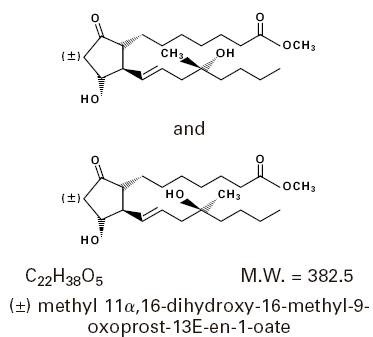Cytotec Recall
Get an alert when a recall is issued.
Questions & Answers
Side Effects & Adverse Reactions
See boxed
WARNINGS.
Legal Issues
There is currently no legal information available for this drug.
FDA Safety Alerts
There are currently no FDA safety alerts available for this drug.
Manufacturer Warnings
There is currently no manufacturer warning information available for this drug.
FDA Labeling Changes
There are currently no FDA labeling changes available for this drug.
Uses
Misoprostol tablets are indicated for reducing the risk of NSAID (nonsteroidal anti-inflammatory drugs, including aspirin)–induced gastric ulcers in patients at high risk of complications from gastric ulcer, e.g., the elderly and patients with concomitant debilitating disease, as well as patients at high risk of developing gastric ulceration, such as patients with a history of ulcer. Misoprostol has not been shown to reduce the risk of duodenal ulcers in patients taking NSAIDs. Misoprostol should be taken for the duration of NSAID therapy. Misoprostol has been shown to reduce the risk of gastric ulcers in controlled studies of 3 months’ duration. It had no effect, compared to placebo, on gastrointestinal pain or discomfort associated with NSAID use.
History
There is currently no drug history available for this drug.
Other Information
Misoprostol oral tablets contain either 100 mcg or 200 mcg of misoprostol, a synthetic prostaglandin E1 analog.
Misoprostol contains approximately equal amounts of the two diastereomers presented below with their enantiomers indicated by (±):

Misoprostol is a water-soluble, viscous liquid chemically described as (±) methyl 11α, 16-dihydroxy-16-methyl-9-oxoprost-13E-en-1-oate.
Each misoprostol tablet for oral administration contains either 100 mcg or 200 mcg of misoprostol and has the following inactive ingredients:
Hydrogenated caster oil, hypromellose, microcrystalline cellose, and sodium starch glycolate.
Sources